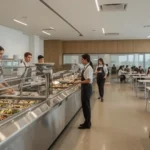Waiters and waitresses, often referred to as servers, are pivotal to the dining experience in any food establishment. As key figures in food and beverage service, they serve as the primary point of contact between the restaurant and its patrons, ensuring that guests have a pleasant and memorable experience.
This article delves into the comprehensive duties and responsibilities of waiters and waitresses, highlighting the skills required, challenges faced, and the significance of their role in the hospitality industry.
Core Duties of Waiters and Waitresses
Greeting and Seating Guests
First impressions matter immensely in the hospitality world. Upon arrival, guests should be welcomed warmly with a smile and guided courteously to their seats. Waiters and waitresses often assist in managing waiting lists, accommodating special seating requests, and ensuring that every customer feels valued from the first interaction.
Key tasks include:
- Smiling, making eye contact, and offering a warm greeting
- Confirming reservations or managing walk-in seating
- Offering assistance with coats or belongings
A friendly and professional welcome sets the tone for the entire dining experience.
Presenting Menus and Making Recommendations
Once seated, guests rely on their server to guide them through the menu, explain specials, and offer personalised suggestions based on preferences or dietary restrictions.
Servers must be knowledgeable about different menu formats, such as à la carte menus, where guests select individual dishes, and table d’hôte menus, which offer a set number of courses at a fixed price.
Understanding these options allows servers to recommend meals that best suit the guest’s dining expectations and enhance their overall experience.
Important elements:
- Knowledge of every menu item, including ingredients and preparation methods
- Ability to suggest wine pairings or recommend popular dishes
- Advising on food allergies and dietary accommodations
An informed and enthusiastic presentation can boost sales and enhance guest satisfaction.
Taking Accurate Orders
Precision is critical in order-taking. Miscommunication or misunderstandings can lead to wrong dishes being served, wasting food, and customer complaints.
Good practices:
- Confirming orders verbally
- Repeating special requests to ensure accuracy
- Entering orders promptly into the POS system or communicating clearly with kitchen staff
Accuracy reduces operational issues and builds trust with guests.
Serving Food and Beverages
Timely, courteous, and careful service of food and drinks is the backbone of a server’s job.
Responsibilities include:
- Delivering the correct order to the correct guest
- Ensuring presentation and temperature standards are met
- Checking back shortly after serving to ensure satisfaction
Servers must remain attentive throughout the meal, anticipating needs without being intrusive.
Handling Payments
When guests have finished dining, servers must manage the payment process professionally and efficiently.
Steps involve:
- Presenting the bill promptly upon request
- Processing cash, credit card, or mobile payments accurately
- Thanking guests warmly and inviting them to return
The last moments of service are vital in leaving a positive final impression.
Cleaning and Resetting Tables
After guests depart, tables must be cleared, cleaned, and reset quickly to accommodate new customers.
Tasks include:
- Wiping tables and chairs thoroughly
- Resetting utensils, napkins, and condiments
- Reporting any maintenance issues (e.g., broken chairs)
Maintaining a clean dining environment reflects the restaurant’s overall standards.
Related: Roles and Responsibilities of a Food and Beverage Manager
Additional Responsibilities
Waiters and waitresses often undertake additional duties to support smooth restaurant operations beyond guest-facing tasks.
Opening and Closing Duties
Servers are often responsible for setting up before opening and securing the dining area after closing.
Opening tasks:
- Polishing cutlery and glassware
- Setting tables and preparing stations
- Reviewing daily specials and promotional items
Closing tasks:
- Cleaning service areas
- Reconciling checks and tips
- Restocking supplies for the next day
A well-organised opening and closing routine contributes to daily efficiency.
Assisting with Inventory and Supplies
Waitstaff help monitor and report on stock levels for items like:
- Beverages (wine, soda, coffee)
- Condiments and napkins
- Crockery and cutlery
Proactive stock management avoids mid-service disruptions.
Health and Safety Compliance
Servers play an important role in ensuring compliance with health regulations.
This includes:
- Proper hand hygiene and personal grooming
- Following food-handling protocols
- Reporting spills or hazards immediately
- Adhering to COVID-19 or post-pandemic health guidelines
Attention to hygiene and safety keeps guests and staff protected.
Assisting with Special Events
During banquets, weddings, and corporate events, servers might:
- Help set up event-specific table arrangements
- Serve large numbers of guests simultaneously
- Manage event-specific menus and timelines
Special event service demands extra speed, precision, and customer care.
Essential Skills and Qualities
Success as a waiter or waitress requires a unique blend of technical expertise and interpersonal skills. Here are the most important qualities:
Before diving into it, here’s a visual overview of the essential skills and qualities every successful waiter or waitress needs to master.

Customer Service Skills
Excellent service can turn first-time visitors into loyal customers. Servers should:
- Be polite, friendly, and approachable
- Listen carefully and respond appropriately
- Handle complaints gracefully and professionally
Hospitality is about exceeding guest expectations consistently.
Communication Skills
Clear and respectful communication is crucial when:
- Taking and confirming orders
- Handling guest requests or complaints
- Coordinating with kitchen and bar staff
Good communication minimises errors and misunderstandings.
Sales Skills
Effective upselling benefits both the restaurant and the server’s tips.
Good upselling techniques include:
- Suggesting appetisers, side dishes, or premium beverages
- Recommending desserts at the right moment
- Highlighting specials enthusiastically but not aggressively
Salesmanship must always feel natural and guest-centred.
Multitasking Ability
During busy periods, servers juggle multiple tables, orders, and requests.
Effective multitasking involves:
- Prioritising urgent guest needs
- Keeping mental track of several tables at different stages
- Managing stress without showing it outwardly
Multitasking well creates smoother operations and happier guests.
Attention to Detail
Small things matter: remembering a regular guest’s favourite drink or ensuring food is served exactly as ordered can greatly enhance the dining experience.
Attention to detail includes:
- Spotting errors in orders
- Noticing when a guest looks ready for the check
- Double-checking allergies and dietary requirements
Details separate good service from exceptional service.
Physical Stamina
The job demands:
- Standing and walking for extended periods
- Carrying heavy trays and lifting supplies
- Navigating crowded spaces swiftly
Physical fitness and endurance are critical, especially during long shifts.
Challenges Faced by Waitstaff
Despite the rewarding aspects, the job comes with its challenges, including:
- Dealing with difficult or rude guests
- Managing high-pressure periods with grace
- Working irregular hours
- Relying on tips for a substantial part of income (especially in some regions)
Overcoming these challenges requires resilience, professionalism, and passion for hospitality.
Conclusion
Waiters and waitresses are much more than order-takers and food carriers. They are essential to the fabric of every restaurant, creating memorable experiences for guests, ensuring operational efficiency, and contributing to a restaurant’s reputation and success.
Mastering the art of service requires a unique blend of people skills, attention to detail, physical stamina, and love for hospitality. For those who embrace the role with professionalism and passion, the rewards — personal growth, financial opportunity, and the joy of making others happy — are truly unparalleled.
Also Read:







